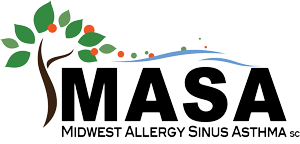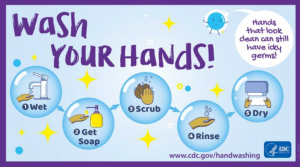Author: Dareen Siri MD FAAAAI FACAAI
Dear Midwest Allergy, Sinus, & Respiratory Patients and Friends,
As we all struggle to stave off sickness or get “ back to health” quickly after a respiratory infection, there are sound practices we can employ to help prevent illness or to get better faster. Whether you have a weak immune system, allergies that cause you to get a lot of colds and sore throats, chronic sinusitis, PANS/PANDAS, COPD, MCAS or just get sick frequently due to having young children or grandchildren you care for, respiratory infections are a huge physical, emotional and financial burden. We hope you find our prevention and wellness tips helpful to combat COVID-19, RSV, influenza, or even the common cold.
Staying vigilant about hygiene practices:
- Hand Hygiene and Care:
-
-
- Wash your hands: Regular handwashing with soap and water remains one of the most effective ways to prevent the spread of viruses and bacteria. Twenty seconds of hand washing (especially getting under fingernails and in between fingers) should be a minimum goal. Drying with disposable paper towels is also more effective at reducing germs on hands than air dryers, although this may be less environmentally friendly.
- Sanitize: Carry hand sanitizer for situations where soap and water are unavailable.
- Protect the hands: Consider wearing cold weather gloves or mittens during activities such as shopping, grocery store visits, etc. where you might touch a lot of objects and surfaces in venues with many visitors. This might be a grocery cart, a railing, or a door handle. Hand coverings not only keep your hands warm, but also prevent you from touching germs. You just have to remember that your gloves or mittens now may be soiled and should be removed before eating, drinking, touching your face, and so forth.
- Keep your skin healthy: Especially after all the washing and sanitizing, your hands may dry out and get cracked and chapped. When the skin barrier gets disrupted, it is much easier for the immune system to react to allergens and irritants, as well as get skin infections. Moisturizers and emollients, especially used frequently and after hand washing, will help keep the skin supple and strong.
- Pay attention to nail care: Germs like to hide under fingernails. Avoid nail biting and nail picking.
- Wash or sanitize before you eat: This may seem obvious, but many of us often forget about the things we have touched, including door hands, keyboards, telephones, and other objects before we reach out to rub our eyes or noses and before we eat. Many of us love our finger foods in particular, ranging from sandwiches to pizza, to chips, to candy. Hand to mouth germ transmission is the main reason we get sick from both respiratory and gastrointestinal pathogens. If you are unable to wash your hands well before eating, consider using utensils or keeping your hands against the wrappers of the food item. Make sure to wash your hands well afterward as well.
-
- Social distancing:
-
-
- Wearing masks in crowded or high-risk settings, and practicing social distancing remain crucial preventive measures.
- If you can, avoid crowds, especially indoors.
- Avoid close contact with sick individuals, or those who have recently been sick, since viral transmission can span weeks for some viruses and hosts.
- Ensure proper ventilation in enclosed spaces. When you are able to, opening windows and doors will help with this.
- If you are caring for children or others who may be harboring an illness, sharing of saliva such as through kissing or transmission through food/utensils should be avoided.
-
- Boosting Immunity:
-
- Choose healthful foods: A well-balanced diet rich in fruits, vegetables, and whole grains provides essential nutrients and pre-biotics that support a robust immune system. Many of these foods have antioxidants that help the immune system counteract germs. Such foods may also help to colonize your body with “good” bacteria which compete with pathogenic bacteria for space and food. Consider incorporating immune-boosting foods such as green leafy vegetables, citrus fruits, yogurt, fermented foods, and garlic into your diet.
- Adequate Rest: Prioritize getting enough sleep, as fatigue can weaken your immune system and make you more susceptible to illnesses. Aim for 7-9 hours of quality sleep each night.
- Stay Hydrated: Proper hydration is vital for overall health and helps maintain the mucous membranes in your respiratory tract, reducing the likelihood of viral infections. Drink plenty of water, herbal teas, and clear broths.
- Nasal Rinsing: Nasal douching or “sinus” rinse with isotonic saline / saltwater has been used for centuries to promote the flow of microscopic hairs lining the nasal passages, expel debris, and discourage the sticking of germs and allergens in the nasal passages.
- Exercise Regularly: Moderate, regular exercise can enhance your immune system and contribute to overall well-being. Engage in activities you enjoy, such as walking, jogging, or yoga, while adhering to any specific recommendations from your provider. Exercise, especially the kind that gets you breathing deeply, helps strengthen lungs and keep airways clear of stagnant mucus.
- Manage Stress: Chronic stress can compromise your immune system. Incorporate stress-management techniques such as mindfulness, deep breathing exercises, or meditation into your daily routine.
- Avoid Toxins: Toxic chemicals to your body, such a tobacco, pollution, excess alcohol, and certain ingested food ingredients, can weaken your immune system.
-
- Body Awareness:
- Avoid Touching Your Face: The average person has been studied to touch their face (eyes, nose, mouth, chin being the most common) an average of 15-20 times per hour. Germs can enter your body through the eyes, nose, and mouth. Minimize the risk of transmission by avoiding touching your face, rubbing your eyes, or rubbing your nose, with unwashed hands. If you need to rub or touch, grab a tissue and use the tissue.
- Cough Etiquette: If you have a cough or sneeze, do so into a tissue or your elbow rather than your hands. Dispose of used tissues promptly and wash your hands afterward.
- Dental Care: Taking care of your teeth and gums with regular brushing, flossing, and rinsing, is correlated with less illness, including respiratory infections and other systemic disease, and healthier outcomes. Changing out or sanitizing toothbrushes frequently may also prevent illness.
- Bathing in Evenings: A bath or shower after being exposed to many germs and allergens at school, work, or activities may keep you healthier.
By incorporating these practices into your daily life, you can bolster your defenses against the common cold and other respiratory infections. Consistent, preventive measures will not only protect you but contribute to the collective effort in maintaining a healthier community during the winter months.
For more information, please click to read our article on Navigating Winter 2023: Recommendations for Respiratory Infections including COVID-19, RSV, Influenza and the Common Cold
image credit: CDC.gov and pikisuperstar on freepik




